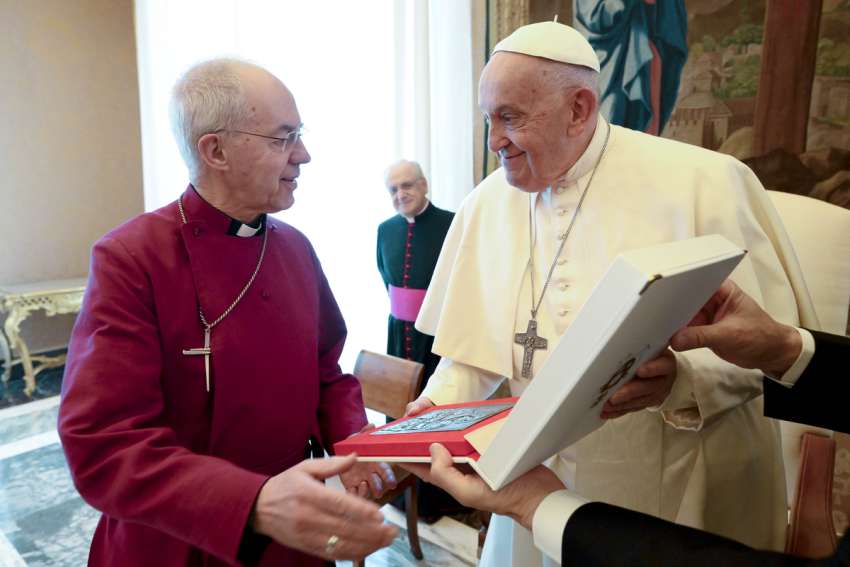"We are called to pray and to listen to one another, seeking to understand each other's concerns and asking ourselves, before enquiring of others, whether we have been docile to the promptings of the Holy Spirit or prey to our own personal or group opinions," Pope Francis said May 2 as he welcomed to the Vatican Anglican Archbishop Justin Welby of Canterbury and the primates of the Anglican churches.
"Surely, the divine way of seeing things will never be one of division, separation or the interruption of dialogue," the pope said. "Rather, God's way leads us to cling ever more fervently to the Lord Jesus, for only in communion with him will we find full communion with one another."
Pope Francis read his speech to the group, but also set aside time to respond to the primates' questions, Archbishop Linda Nicholls, primate of the Anglican Church of Canada, told reporters. The questions, she said, allowed the pope to talk about "his own passions in ministry, unity in diversity, harmony, and he said in several ways that 'war is always, always, always a defeat.'"
The Anglican primates are the senior bishops, archbishops or moderators of the 42-member churches of the Anglican Communion; they meet every two years. A spokeswoman for the Anglican Communion said 32 of the primates were present in Rome; some were unable to attend while others refused to join the gathering, mainly to protest a decision by the Church of England to bless same-sex unions.
The primates' meeting April 26–May 3 marked their first group pilgrimage to Rome. Their visit included daily Bible studies on the Book of Acts, focusing on leadership and what it means to share together in joint mission and witness, as well as discussions and pilgrimages to St. Peter's Basilica and the tomb of St. Peter and to the Basilica of St. Paul Outside the Walls and the tomb of St. Paul.
During their meeting, the primates were reviewing a paper on structure and decision-making in the Anglican Communion and proposals for addressing differences and disagreements within the church.
Pope Francis told them how the Easter season readings of the Acts of the Apostles reminds all Christians of the joys and struggles the Christian community has faced from the beginning.
"Amid so many glorious pages that speak of faith and fraternity, courage in the face of persecution, the joyful spread of the Gospel and its opening to the Gentiles," he said, "the sacred author does not conceal moments of tension and misunderstanding, often born of the frailty of the disciples, or different approaches to the relationship with past tradition."
But the lesson, the pope said, is that the Holy Spirit must be allowed to work in the hearts of individuals and in the community.
"We must not be afraid of disagreements, but embrace them, leaving the primacy to the Paraclete," the pope said.
Pope Francis also told the Anglicans that he knows the role of the pope, the Bishop of Rome, "is still a controversial and divisive issue among Christians," but he said he hoped ecumenical study and dialogue, encouraged by St. John Paul II, would continue trying "to understand how the Petrine ministry can develop as a service of love for all."


